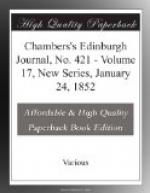Thus enlightened on the subject of their private history, it was with very different feelings I afterwards regarded these unfortunate children. Bereft of both parents, and cast upon a world with the ways of which they were utterly unacquainted, and in which they might be doomed to the most painful struggles even to procure a bare subsistence, one treasure was yet left them—it was the treasure of each other’s love. So far as the depth of this feeling could be estimated from the looks and actions of both, it was all in all to each. But the sacred bond that bound them was destined to be rudely rent asunder. The cold winds of autumn began to visit too roughly the fair pale face of the younger girl, and the unmistakable indications of consumption made their appearance: the harassing cough, the hectic cheek, the deep-settled pain in the side, the failing breath. Against these dread forerunners it was vain long to contend; and the poor child had to remain at home in her solitary sick-chamber, while the loving sister toiled harder than ever to provide, if possible, the means of comfort and restoration to health. All the world knows the ending of such a hopeless strife as this. It is sometimes the will of Heaven that the path of virtue, like that of glory, leads but to the grave. So it was in the present instance: the blossom of this fair young life withered away, and the grass-fringed lips of the child’s early tomb closed over the lifeless relics ere spring had dawned upon the year.
Sorrow had graven legible traces upon the brow of my hapless mentor when I saw her again. How different now was the vision that greeted my daily sight from that of former years! The want that admits not of idle wailing compelled her still to pursue her daily course of labour, and she pursued it with the same constancy and punctuality as she had ever done. But the exquisitely chiselled face, the majestic gait, the elastic step—the beauty and glory of youth, unshaken because unassaulted by death and sorrow—where were they? Alas! all the bewitching charms of her former being had gone down into the grave of her mother and sister; and she, their support and idol, seemed no more now than she really was—a wayworn, solitary, and isolated straggler for daily bread.




